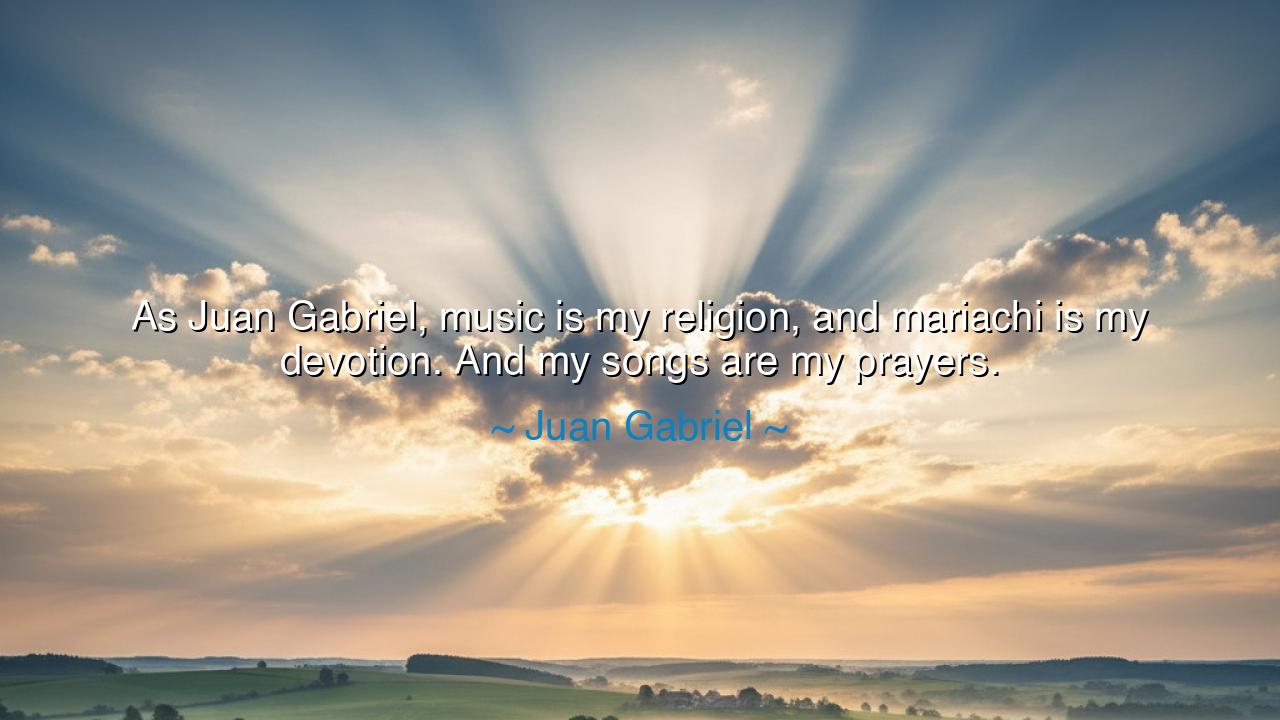
As Juan Gabriel, music is my religion, and mariachi is my
As Juan Gabriel, music is my religion, and mariachi is my devotion. And my songs are my prayers.






In the eternal dance of life, where the heart yearns for connection and the soul seeks meaning, the words of Juan Gabriel echo with a truth that transcends both music and religion: "As Juan Gabriel, music is my religion, and mariachi is my devotion. And my songs are my prayers." These words, though rooted in the world of music, speak to the profound and sacred nature of art itself. Juan Gabriel, a legendary figure in Mexican music, reveals that his religion is not bound by rituals or doctrines, but by the pure expression of his heart through music. The divine is not something distant or abstract for him, but something that flows through his songs, which become his prayers, his offering to the world, and to the higher powers he believes in.
In the ancient world, music was often considered a divine language, a bridge between humanity and the gods. The Greeks, particularly, saw music as a powerful force, capable of stirring the soul and connecting the individual to the cosmos. Pythagoras, the philosopher and mathematician, believed that the universe itself was governed by musical harmony, a cosmic order that could be understood through the laws of music. For him, music was not just an art form, but a way to align oneself with the deeper truths of existence. Similarly, the ancient Egyptians saw music as a sacred tool for spiritual and ritualistic purposes, using melodies and rhythms in their temples to invoke the gods and communicate with the divine. For these ancient cultures, music was never mere entertainment; it was a spiritual practice, a way to express the inexpressible and to connect with the divine energy that courses through all things.
Juan Gabriel's declaration that music is his religion draws on this ancient understanding of art as a sacred force. His statement reflects a deep belief that music has the power to reach beyond the physical world, tapping into the spiritual essence of being. Through his mariachi music, a genre steeped in the rich cultural traditions of Mexico, he does not simply entertain or perform, but offers a form of devotion, a ritual of sorts. Like the ancient musicians who used their art to invoke the divine, Juan Gabriel transforms his songs into prayers, invoking emotions, memories, and visions that transcend the mundane and connect the listener to something greater. His mariachi is not just a genre; it is a spiritual practice, a way of offering his soul to the world.
In Juan Gabriel’s life, music was not only a means of personal expression but also a way of connecting with others. His songs, particularly those in the mariachi style, were infused with deep emotion and vulnerability, touching the hearts of millions. His voice, like the voice of the ancient bards who sang of gods and heroes, carried the weight of human experience—joy, sorrow, love, and loss—transforming everyday emotions into universal truths. One of his most famous songs, "Querida," is a perfect example of how music becomes a medium for sacred expression. Through the sheer passion and yearning in his voice, he conveys the depth of love and loss, making his songs not just performances, but acts of devotion, where every note is a prayer to the spirit of human connection.
Throughout history, music has served as a form of devotion for countless artists, many of whom, like Juan Gabriel, found in their craft not only meaning but also a way to commune with something divine. Ludwig van Beethoven, despite his deafness, poured his soul into his symphonies, channeling his deepest emotions into works that transcended the physical realm and touched upon the sublime. His ninth symphony, with its Ode to Joy, is considered a hymn to human unity, expressing the divine potential of human love and solidarity through music. Similarly, Bob Dylan—a more modern figure—has often described his songs as a way of conveying truth, his lyrics a form of prophecy and devotion to the human spirit. Like these great artists, Juan Gabriel too used music as a means of personal salvation and as a spiritual offering to the world.
The lesson in Juan Gabriel’s words is clear: art, in its highest form, is a spiritual practice. Whether it is music, painting, poetry, or any other form of creative expression, it holds the potential to connect us with the divine, to offer our soul to the world, and to engage with the greater forces of love and humanity. Art is not simply a pursuit of personal glory or fame; it is an act of devotion, a sacred practice that allows us to offer our most authentic selves to others. When we create or experience art, we are engaging in a ritual that transcends the physical and touches on the divine within each of us. Juan Gabriel understood this truth, and his music became a bridge between the human heart and the universal spirit of love.
In our own lives, let us follow Juan Gabriel's example by embracing the sacred nature of our own creative expression. Whether it be through music, writing, dance, or any other form of art, let us offer our hearts and souls to the world in a spirit of devotion and love. When we create with authenticity and passion, we too are engaged in a spiritual practice, a form of prayer that transcends the mundane and touches the divine. And in doing so, we remind ourselves that art is not just a means of expression, but a way of connecting with the world, with others, and with the deeper truths of existence. Through this, we may live more fully, embracing the beauty of life as both an act of worship and devotion.






AAdministratorAdministrator
Welcome, honored guests. Please leave a comment, we will respond soon